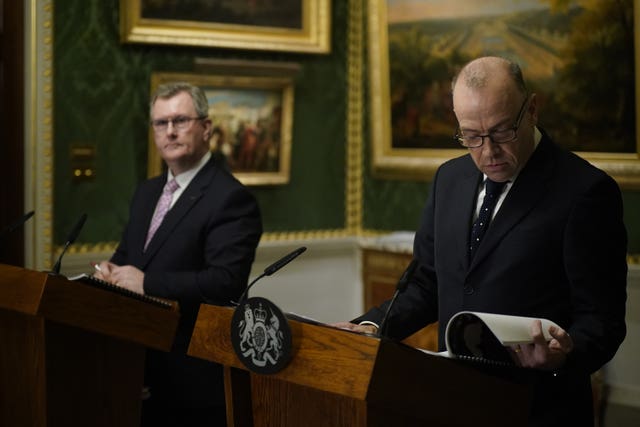
Northern Ireland Secretary Chris Heaton-Harris has admitted he is still learning about unionism.
He said he was at “GCSE level” in his understanding of the unionist tradition in Northern Irish politics.
The Cabinet minister was speaking alongside Democratic Unionist Party leader Sir Jeffrey Donaldson following the publication of a deal aimed at restoring powersharing in Northern Ireland.
Mr Heaton-Harris said the wrangling with the DUP had sometimes been “frustrating”.
At a joint press conference in Belfast with Sir Jeffrey, Mr Heaton-Harris said he could understand the DUP’s concerns about the post-Brexit trading arrangements, which critics have blamed for effectively creating a trade barrier in the Irish Sea between Great Britain and Northern Ireland.
“It’s been a long process and at times – forgive me Jeffrey – it has been frustrating,” Mr Heaton-Harris said.
“Sir Jeffrey is actually quite a tenacious negotiator and he is a man of principle, he knows exactly what he stands for.
“To be quite frank, I could understand the points he was making.

“I’m a keen Brexiteer, I want the whole of my country to see the benefits of leaving the European Union, something we did four years ago today.
“But also I probably needed some extra explanation about unionism in Northern Ireland. I’ve had a decent education, I’m probably on GCSE level at this point but I’m sure it will continue until I get my masters.”
He said the deal reached with the DUP demonstrates a commitment to the union and the people of Northern Ireland.
Mr Heaton-Harris is not the first Northern Ireland secretary who has admitted to difficulties grappling with the complexity of the politics there.
In 2018, then Northern Ireland secretary Karen Bradley said: “I didn’t understand things like when elections are fought for example in Northern Ireland – people who are nationalists don’t vote for unionist parties and vice-versa.”


Why are you making commenting on The National only available to subscribers?
We know there are thousands of National readers who want to debate, argue and go back and forth in the comments section of our stories. We’ve got the most informed readers in Scotland, asking each other the big questions about the future of our country.
Unfortunately, though, these important debates are being spoiled by a vocal minority of trolls who aren’t really interested in the issues, try to derail the conversations, register under fake names, and post vile abuse.
So that’s why we’ve decided to make the ability to comment only available to our paying subscribers. That way, all the trolls who post abuse on our website will have to pay if they want to join the debate – and risk a permanent ban from the account that they subscribe with.
The conversation will go back to what it should be about – people who care passionately about the issues, but disagree constructively on what we should do about them. Let’s get that debate started!
Callum Baird, Editor of The National
Comments: Our rules
We want our comments to be a lively and valuable part of our community - a place where readers can debate and engage with the most important local issues. The ability to comment on our stories is a privilege, not a right, however, and that privilege may be withdrawn if it is abused or misused.
Please report any comments that break our rules.
Read the rules hereLast Updated:
Report this comment Cancel